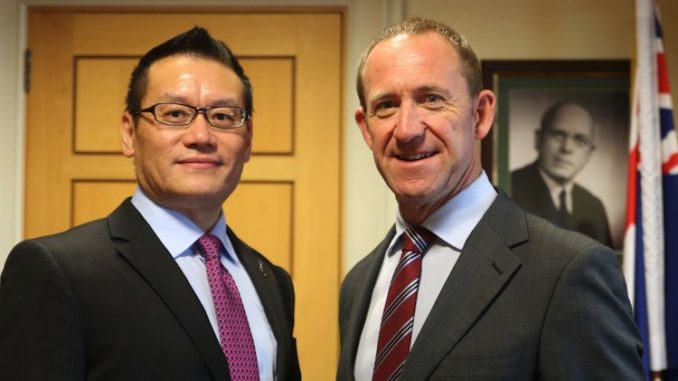
Despite media suggesting that all roads to foreign political interference lead to Beijing, Hon Heather Roy writes that only a broader understanding of the issue will ensure the resilience of our electoral system. A National Security Strategy and an independent National Security Adviser would help.
Sir Arthur Conan Doyle’s 1892 short story The Adventure of Silver Blaze was based around the kidnapping of a prize race horse and the apparent murder of its trainer. Fictional detective Sherlock Holmes solves the case; pointing out to Police the guard dog at the stables didn’t bark, thereby implying the intruder was not a stranger.
The analysis error identified by Holmes – using what is evident rather than all information (or, making assumptions based on partial evidence) – has been applied in many disciplines. Doyle’s story has some relevance in considering electoral interference.
The most recent discussion on foreign interference in New Zealand politics centred around the conduct of the Government members of the Justice Select Committee earlier this year.
Tasked with a triennial review of the electoral process the committee called for submissions on the 2016 local body and 2017 general elections. After submissions closed, Justice Minster Andrew Little asked the committee to “look at the resilience of our electoral system against foreign interference risks”.
China expert, Professor Anne-Marie Brady asked to appear before the committee to make a submission on the extended terms of reference. Chair Raymond Huo and the three other Labour MPs on the Justice Committee blocked Professor Brady’s entreaty. It seems only the SIS and GCSB were invited to present to the committee on the extended terms, the public being excluded by omission.
Media pressure following National MP Nick Smith raising the issue publicly forced an embarrassing U-turn by Raymond Huo. Submissions were subsequently called for from the public and Professor Brady was then invited to submit on foreign interference after all.
The fracas also highlighted a conflict of interest – Raymond Huo had previously featured in Professor Brady’s research on Chinese influence in New Zealand. To have denied her the opportunity to participate in a subject she is considered expert in is an affront to the democratic process. The decision to exclude hearing from all except the security agencies was also an abuse of the checks and balances Parliament’s select committees provide our democratic process.
Months later, Huo finally did the right thing and recused himself from chairing Professor Brady’s submission. However, to fixate on China or any country for that matter takes us back to ‘Silver Blaze.’
History shows there have always been attempts to influence elections around the world and that will not change. From ballot box stuffing to tampering with voting machines or other forms of corruption, whole studies have been conducted.
One such study shows that the most prolific ‘interferer’ is the United States, followed a distant second by Russia.
Technical interference can be identified and guarded against. What cannot be so easily addressed is when ‘the dog does not bark’ i.e. the influencer is known to the audience and believes the message to be legitimate. Thus, the crime is successful and goes undetected.
Electoral shaping has always existed; from union officials telling members how to vote through to preachers in the pulpit doing the same. What has changed is the reach and versatility of digital media.
Anyone anywhere in the world can speak to the New Zealand voter. They can conceal their identity and their intent while basing their message on data about the audience gleaned from open source intelligence such as Facebook. Voters in a specific Twitter feed or SubReddit find themselves agreeing with most of what is posted.
This echo chamber effect creates credibility for the message as there are few, if any, discerning voices. The challenge is to differentiate between legitimate political campaigning and electoral interference.
In discussing communication channels during the official election period, the subject of foreign language media appears. Chinese and Indian language speakers in New Zealand have a plethora of TV, radio and print media options, as do a number of other ethnic groups.
There are also several religious TV and radio channels. Most New Zealanders don’t understand what is being said on Maori TV or the Te Reo channel. On demand streaming provides a vast range of other political channel options.
Should we worry about these? Perhaps, but it would be a waste of time and a huge ‘own goal’ attack on our democracy.
No doubt, some in the intelligence community would see the solution being ever more resources to allow them to monitor what is being said in foreign language media. That would be a mistake. They are of no more or less concern than what our own friends and allies are up to behind the scenes. We would be naïve to think that they aren’t actively pursuing their own nation’s best interests in regard to New Zealand politics.
Given the seemingly insurmountable scale of channels for foreign entities (both nation state and non-state actors) to conduct political information operations in New Zealand, what is to be done?
By far the most important thing we can do to build and maintain a resilient democracy is to ‘teach the dog to always bark.’ New Zealand is best served when we have a cohesive government held to account by a strong opposition. We also need a fearless media prepared to speak out as journalist Thomas Coughlan did on the Huo case.
The recent raids by Australian Federal Police on ABC offices and journalists is the exact opposite of what will build our defence against foreign interference. Even the Australian Prime Minister and Leader of the Opposition have distanced themselves from the AFP action. We have seen our own version of this with the New Zealand Police raid on the home of Nicky Hager.
The strength of democracy is directly related to our ability to defend it. New Zealand is the poorer for having no National Security Strategy. If we did have one and the supporting independence of a National Security Advisor, foreign political interference would be part of their remit.
The final part of the solution is a resilient voter. It’s said that Kiwis love politics but hate politicians. In order to change this attitude a few other things have to occur. More people need to stand for office at all levels so our representatives traverse a genuine cross-section of the population.
One of the impediments to this happening right now is the personality-based ‘gotcha’ politics which is off-putting to many aspirants. The media have a role to play in this, as do politicians themselves. We need to encourage greater engagement – particularly in regard to voter turnout.
Finally, and perhaps most importantly of all, we should consider teaching civics in schools. By the time young people reach voting age they should be well informed about what a healthy democracy looks like including being able to recognise when someone attempts to influence their vote inappropriately. In the land of the blind, even the one-eyed man is king.








